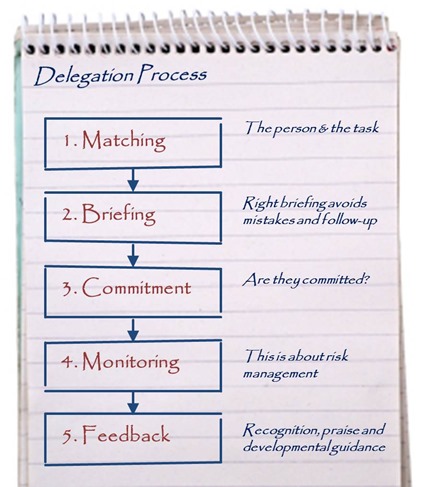Pocketblog has gone back to basics. This is part of an extended management course.
Management is not about doing things: it is about getting things done. So a large part of your responsibility is allocating work among your team and developing people to take on more demanding challenges. Delegation – getting other people to do aspects of your work – is a part both of effective working and of developing people.
Whilst there are lots of poor reasons for delegating – like off-loading unpleasant tasks, or abdicating responsibility – there are many positive benefits to you, to your team, and to your organisation.
Exercise 1: The Reasons to Delegate?
Make a list of all of the good reasons to delegate. To help you, consider the question from three perspectives:
- How can you benefit?
- How can your team members benefit?
- How can your organisation benefit?
Failure to delegate
The problem is that many managers constantly find excuses for not delegating; even when they know they ought to for many of the reasons you have probably identified. What are yours?
Exercise 2: Excuses for Not Delegating
Here are some excuses I commonly encounter. For each of these, how would you counter the excuse?
- “I’d be better off doing it myself”
- “I don’t want to overload my staff”
- “I don’t have the time to delegate”
- “I know exactly how I want it done”
- “If I ask him/her to do it, he/she will be nagging me every five minutes”
How to Delegate
Some people use these excuses simply because they don’t feel comfortable with the process of delegation. Indeed, many guides either make it seem like a big deal, or they miss out an important aspect of the process, leaving people wondering why it fails. So let’s look at the basic delegation process.
Step 1. Matching
Understand the task, its level of importance and urgency, and the risks associated with it. Then consider the people available to you, and their abilities, strengths, preferences, and their existing commitments. Also think about their development routes. Now match the task to the most suitable person.
Step 2. Briefing
Brief effectively. Taking time to do this properly is an investment that will result in fewer interruptions, a greater chance of innovation and excellence, and a reduced chance of mistakes and failures.
Step 3. Commitment
After you have briefed and answered any questions, ask if they:
- Understand the task required
- Can carry out the task required – do they have the ability and availability?
- Believe the resources and time allocated are sufficient for the task required
Then ask for their commitment to do the task required. In return, offer your commitment to support and monitor the process.
Step 4. Monitoring
An important part of risk management and of developing the person you have delegated to is to monitor their performance. Monitor more or less frequently, depending on your level of confidence and certainty, and the level of risk. Remember: when you delegate a task, you retain responsibility for it.
Step 5. Feedback
When the job is done, offer objective feedback on performance and listen to what they have to say about their experience and any concerns. Recognise the work done and contribution made, reward it with thanks and praise, and highlight what the person can learn from their experience.







